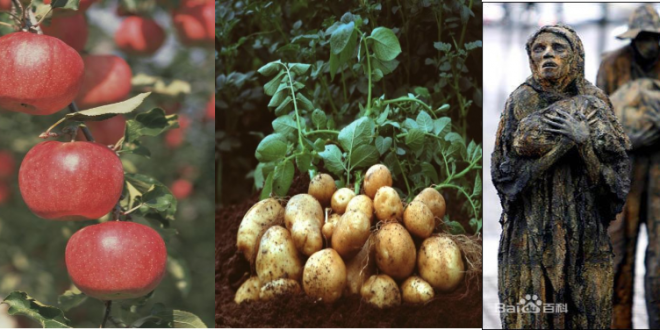By Brian Wu
The relationship between plants and people is subtle. People may think that humans don’t have many influences on plants and that apples and potatoes are just foodstuffs. However, these crops are highly connected to humans, and society shapes the globalization of apples and potatoes by several specific components. Economic, environmental, and cultural factors play a decisive role and affect the globalization of apples and potatoes due to their specific positive and negative impacts.
Culture plays an important role in the globalization of apples and potatoes, as people prefer sweet and natural food. In the early 1800s, when Johnny Appleseed brought sweet apples in North America, there was a huge demand for these apples, as people are sensitive to and adore the sweet taste, and crabapple trees produced bitter apples. Therefore, farmers started growing this specific species due to the culture, and sweet apple varieties became globalized. As a result of the Green Revolution, scientists started using GMO technology in potatoes such as the New Leaf potato in order to increase yield and prevent diseases and insects. Nevertheless, after people understood these potatoes are GMOs, they started resisting these trans-gene potatoes because people are afraid of reckless technology and desire natural food. Although many scientists claim that GMO foods do more good than harm, McDonald’s no longer uses GMO potatoes due to public pressure, and less New Leaf potatoes are produced. Cultural factors have a great impact on the globalization of apples and potatoes.
The economy is a vital factor for the globalization of apples and potatoes because they have abundant economic value. In commercial agriculture, farmers want to maximize profits, they prefer growing the specific species if it can gain a lot of profits. Russet Burbank, the most distributed potato, is the main resource for making french fries. Fast food restaurants, such as McDonald’s, require a huge number of Russet Burbank as capital goods to keep in business. Therefore, as the demand increases, the price of Russet Burbank increases, so farmers prefer to only grow Russet Burbank as monoculture to get profits, which leads to the globalization of the potato. However, the economy can be harmful to the globalization of apples and potatoes. For instance, farmers used to grow the sweet apples due to the desire of people. Nevertheless, too many sweet apples are produced such that the price decreases and people tire of the sweetness; thus, sweet apples lose its economic value. Therefore, the farmer who grows that apple bears huge economic losses. As a result, some farmers stop growing sweet apples, which decreases the globalization of the apple. The economic factors can make positive and negative influences on apples and potatoes’ globalization.
The environment factors also influence the globalization of apples and potatoes. When apples were introduced to North America, they spread so fast because apples can adapt to different environments.As a result, people cultivated more apples as they are stable food sources. Ireland farmers grew only one type of potatoes, the Lumper, as the monoculture, which leads to the globalization of this potatoes. Unfortunately, in 1845, all the potatoes were infected by a type of mold which can cause serious decay, and the adoption of a single breed of potato made the Irish vulnerable. The failure of potato crops caused more than one million Irish people to die of hunger. The potatoes in Ireland were destroyed, and the globalization decreased. The growth of apples and potatoes depends on the environment, which impacts their globalization.
In conclusion, apples and potatoes are wildly globalized due to their specific features, and globalization factors such as culture, economy, and environment also make a great impact on these crops because they rely on humans and the environment. These factors have both benefits and repercussions for the globalization of apples and potatoes.
 Tempus Magazine By Students, For Students
Tempus Magazine By Students, For Students 



